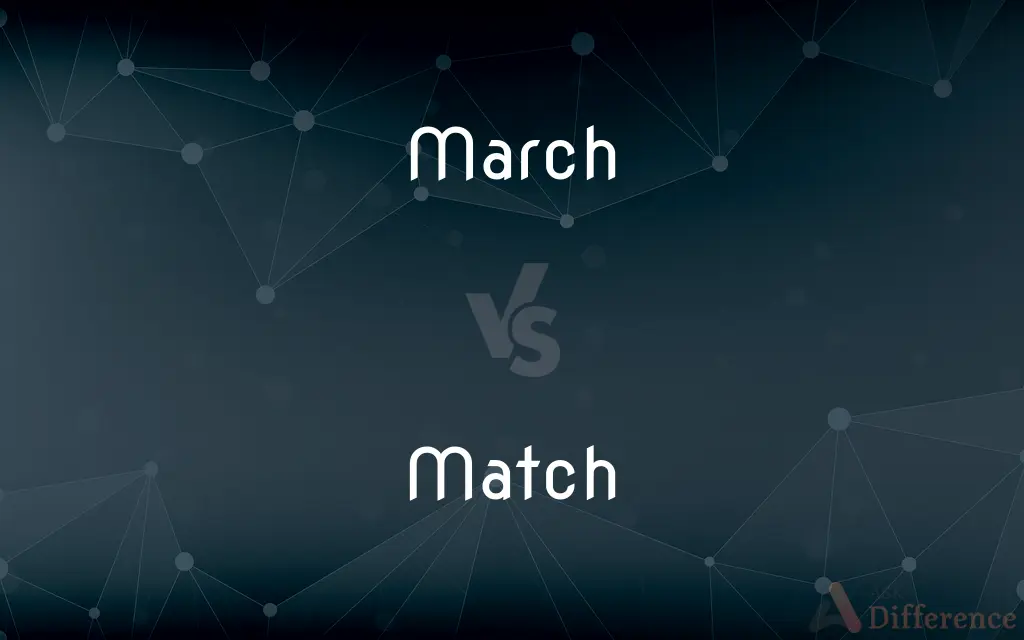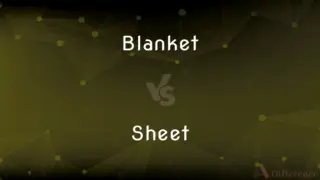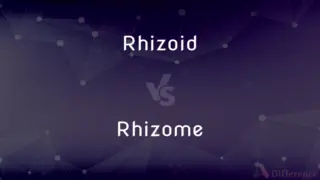March vs. Match — What's the Difference?
By Fiza Rafique & Urooj Arif — Updated on March 6, 2024
"March" refers to walking in a synchronized, purposeful manner, often associated with military or protest movements, while "match" can denote either a contest or game between two sides or the act of pairing things that are alike.

Difference Between March and Match
Table of Contents
ADVERTISEMENT
Key Differences
"March" is commonly used to describe the act of walking with a steady, rhythmic stride, especially in a group setting such as a parade or military procession. It implies purpose and coordination, often associated with displays of solidarity or commemoration. On the other hand, "match" has multiple meanings; it can refer to a competitive event, like a sports game, where two or more parties vie against each other, or the act of pairing objects or individuals based on similarity, as in matching colors or matching a job to a candidate.
While "march" conveys movement and progression with a group dynamic, "match" emphasizes compatibility, similarity, or rivalry, depending on the context. "Match" can also be used as a noun to describe an object used for igniting a fire, showcasing the word's versatility beyond actions and relationships.
In terms of etymology, "march" has origins related to steady movement and has evolved to embody organized collective actions, particularly for political or social causes. Conversely, "match" comes from a word meaning "mate" or "companion," which ties back to its use in denoting similarity or competition between equals.
The use of "march" can also symbolize advancement or progress in a broader sense, reflecting a journey or forward motion toward a goal. Whereas "match," especially as a verb, signifies the process of making or finding correspondences, whether in attributes, qualities, or in the sense of competition, it represents a pairing or opposition that highlights similarities or disparities.
Comparison Chart
Primary Meaning
A synchronized and purposeful walk, often in a group.
A contest or game between sides, or the act of pairing like items.
ADVERTISEMENT
Context of Use
Military processions, protests, commemorations.
Sports, competitions, making pairs, igniting fires.
Implication
Coordination, solidarity, progression.
Compatibility, rivalry, similarity.
Secondary Meanings
None directly; broader implications of advancement or progress.
An object used for ignition (noun).
Etymology
Related to steady movement, evolved into organized collective actions.
Originating from a word meaning "mate" or "companion."
Symbolism
Often symbolizes unity and collective action toward a common goal.
Can symbolize the quest for compatibility or the thrill of competition.
Compare with Definitions
March
To walk in a synchronized, purposeful manner.
The soldiers began to march in the parade.
Match
To pair like items or people.
She matched the socks by color.
March
A public, organized walk to support a cause.
They participated in a march for climate change.
Match
A competition to find a winner.
The chess match lasted for hours.
March
Pertains to a specific month of the year.
Her birthday is in March.
Match
An object used to ignite a fire.
He used a match to light the candle.
March
Symbolizes advancement or progress.
The march of technology is relentless.
Match
To correspond or be suitable.
His skills match the job requirements.
March
The act of moving forward or progressing.
The company's march towards innovation continues.
Match
A contest or game between two sides.
The football match attracted thousands of fans.
March
March is the third month of the year in both the Julian and Gregorian calendars. It is the second of seven months to have a length of 31 days.
Match
A game or contest in which two or more persons, animals, or teams oppose and compete with each other
A soccer match.
March
To walk steadily and rhythmically forward in step with others.
Match
To find or produce a counterpart to
It's difficult to match the color of old paint.
March
To begin to move in such a manner
The troops will march at dawn.
Match
To set in comparison; compare
Beauty that could never be matched.
March
To proceed directly and purposefully
Marched in and demanded to see the manager.
Match
To be exactly like another; correspond exactly
Do the two socks match?.
March
To progress steadily onward; advance
Time marches on.
Match
An agreement or compact.
March
To participate in an organized walk, as for a public cause.
Match
A burning piece of wood or cardboard;
If you drop a match in there the whole place will explode
March
To cause to move or otherwise progress in a steady rhythmical manner
March soldiers into battle.
Marched us off to the dentist.
Match
An exact duplicate;
When a match is found an entry is made in the notebook
March
To traverse by progressing steadily and rhythmically
They marched the route in a day.
Match
The score needed to win a match
March
To have a common boundary
England marches with Scotland.
March
To proceed by walking in a body or in military order; as, the German army marched into France.
March
Walk fast, with regular or measured steps; walk with a stride;
He marched into the classroom and announced the exam
The soldiers marched across the border
March
March in protest; take part in a demonstration;
Thousands demonstrated against globalization during the meeting of the most powerful economic nations in Seattle
March
Walk ostentatiously;
She parades her new husband around town
Common Curiosities
Does "march" have any meanings besides movement?
Beyond physical movement, "march" can symbolize progress or advancement in a broader context, such as the march of technology.
What is the main difference between "march" and "match"?
"March" primarily refers to organized, purposeful walking, while "match" can mean a competition or the act of pairing similar entities.
How can "match" be used in different contexts?
"Match" can refer to a competitive event, the act of pairing similar items, or even a tool for igniting a fire, depending on the context.
How do "march" and "match" differ in their implications of group dynamics?
"March" implies a collective, unified movement towards a goal, while "match" focuses more on individual or team competition or the act of pairing based on compatibility.
Is "march" used in any contexts outside of physical walking?
Yes, "march" can metaphorically refer to the progress or advancement of something, such as a social movement or technological development.
Are there any other meanings of "match" not related to similarity or competition?
Apart from denoting similarity or competition, "match" can also specifically refer to a small stick or piece of material used for lighting a fire.
What role do "march" and "match" play in language beyond their literal meanings?
Both words extend into metaphorical and symbolic usage, with "march" symbolizing progress and unity, and "match" reflecting the search for compatibility or the excitement of competition.
How does cultural context affect the usage of "march" and "match"?
Cultural context can influence the perception of these words, with "march" possibly evoking historical or political movements in certain regions, and "match" varying in significance based on the popularity of sports or activities.
Can "match" imply a sense of equality or compatibility beyond physical or tangible pairing?
Yes, "match" can imply a deep level of compatibility or suitability, such as matching a person's skills to a job or matching in terms of personality in relationships.
Can "march" only be used to describe military actions?
No, "march" can describe any synchronized walking, including protests and ceremonial parades, not just military actions.
Share Your Discovery

Previous Comparison
Blanket vs. Sheet
Next Comparison
Rhizoid vs. RhizomeAuthor Spotlight
Written by
Fiza RafiqueFiza Rafique is a skilled content writer at AskDifference.com, where she meticulously refines and enhances written pieces. Drawing from her vast editorial expertise, Fiza ensures clarity, accuracy, and precision in every article. Passionate about language, she continually seeks to elevate the quality of content for readers worldwide.
Co-written by
Urooj ArifUrooj is a skilled content writer at Ask Difference, known for her exceptional ability to simplify complex topics into engaging and informative content. With a passion for research and a flair for clear, concise writing, she consistently delivers articles that resonate with our diverse audience.














































